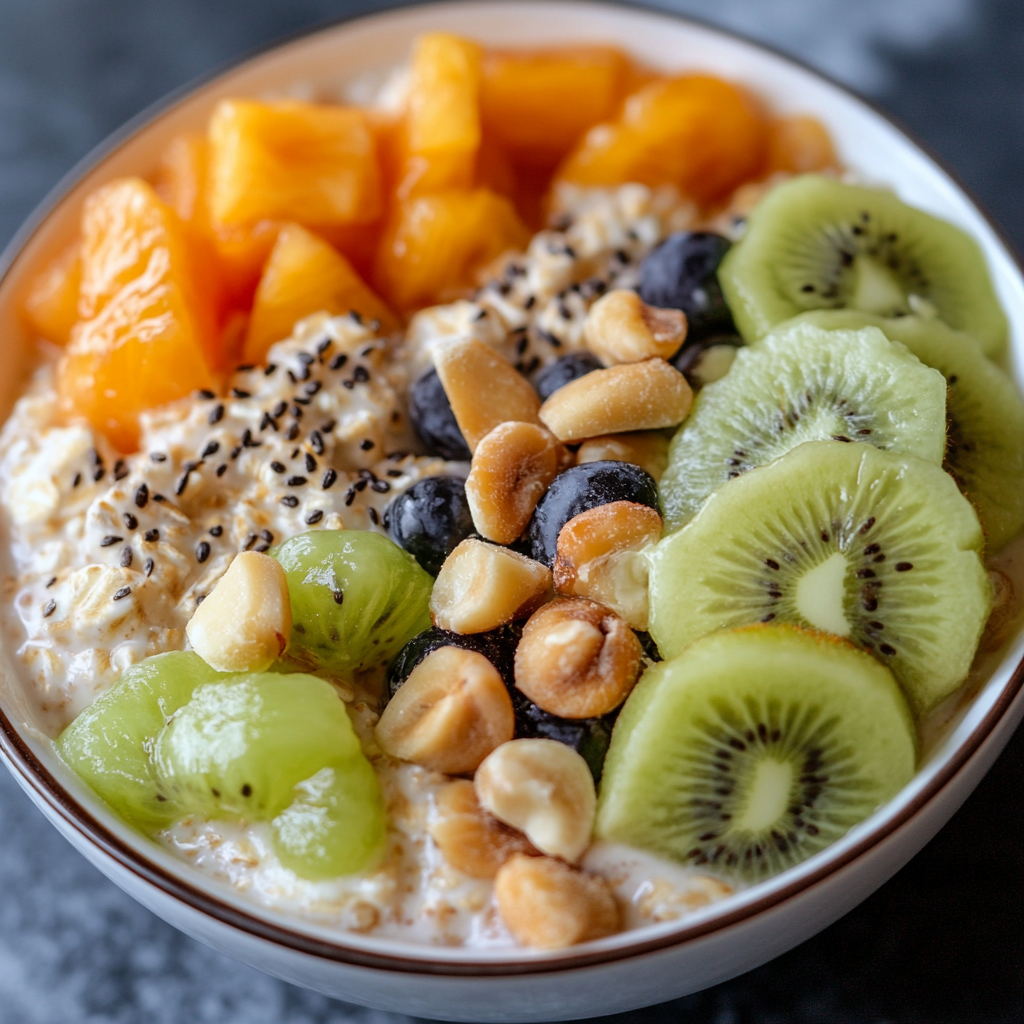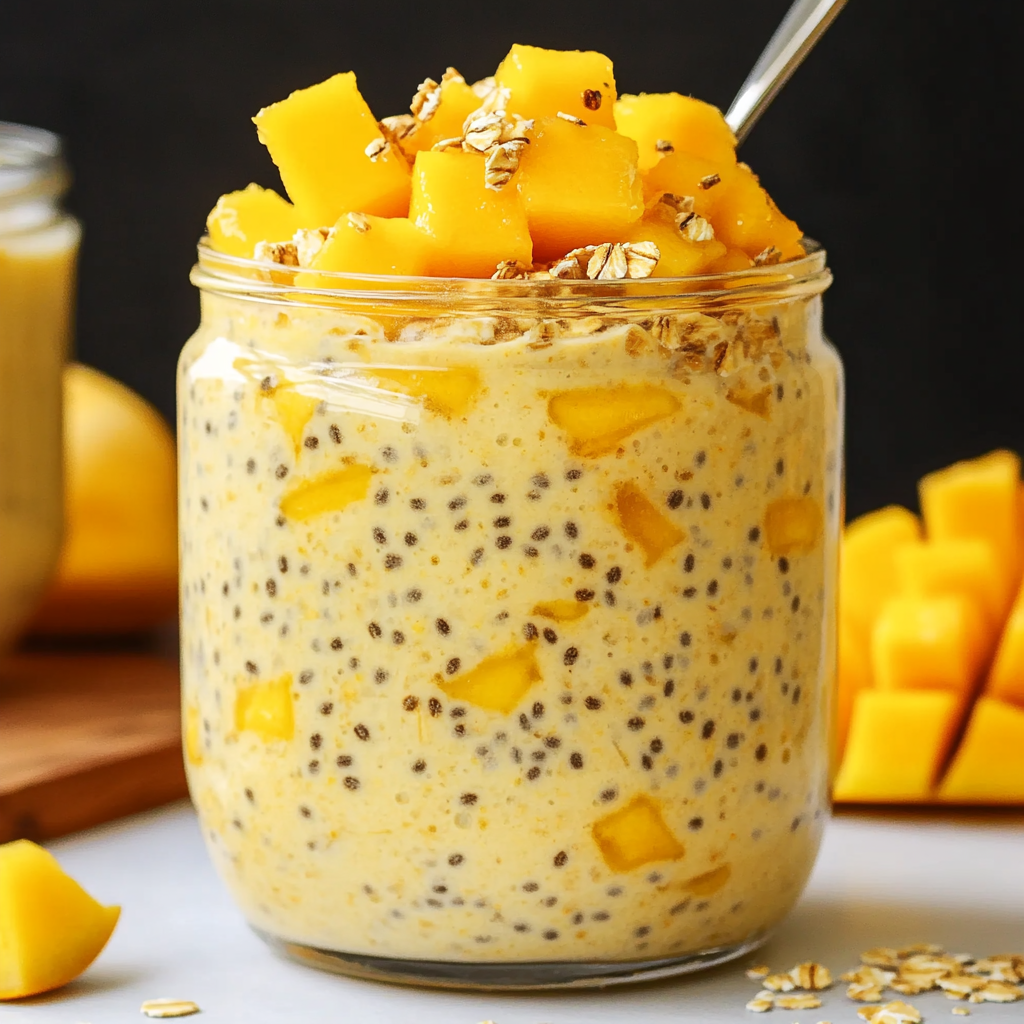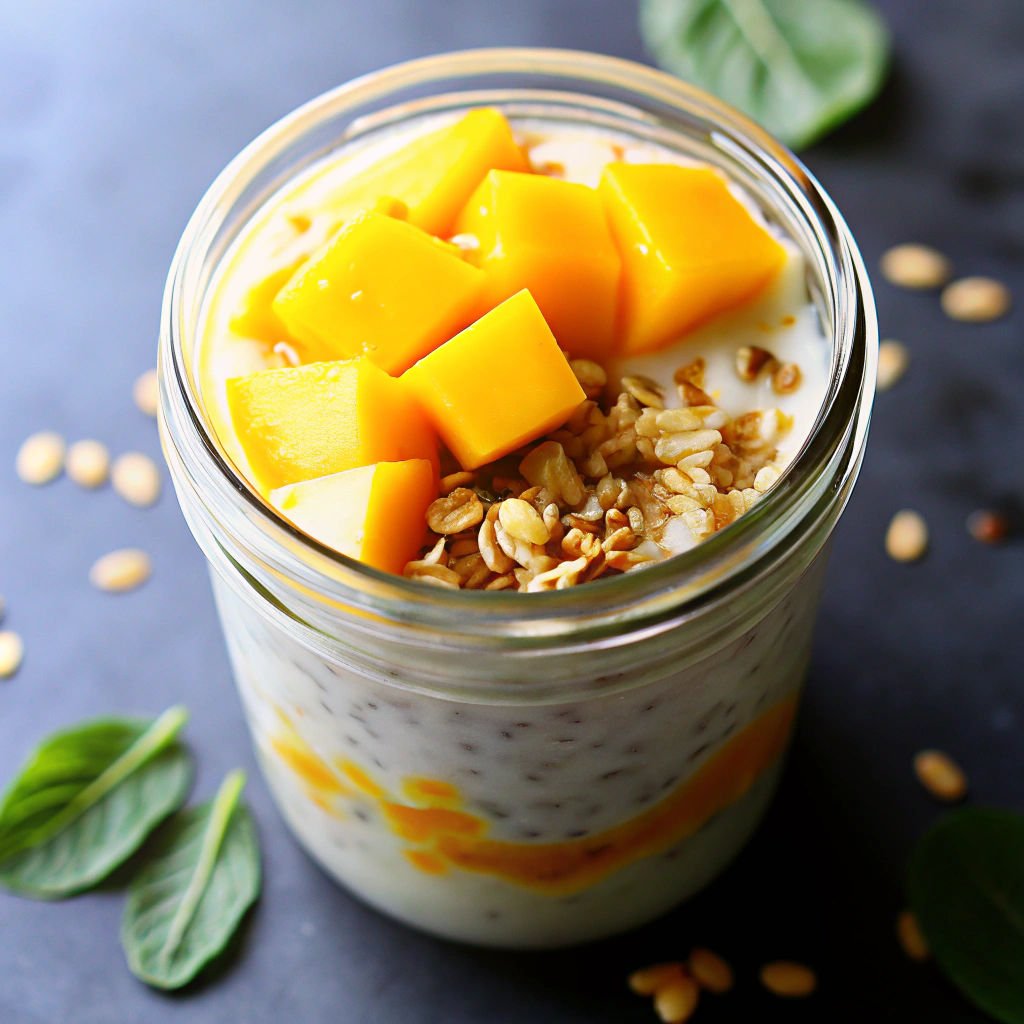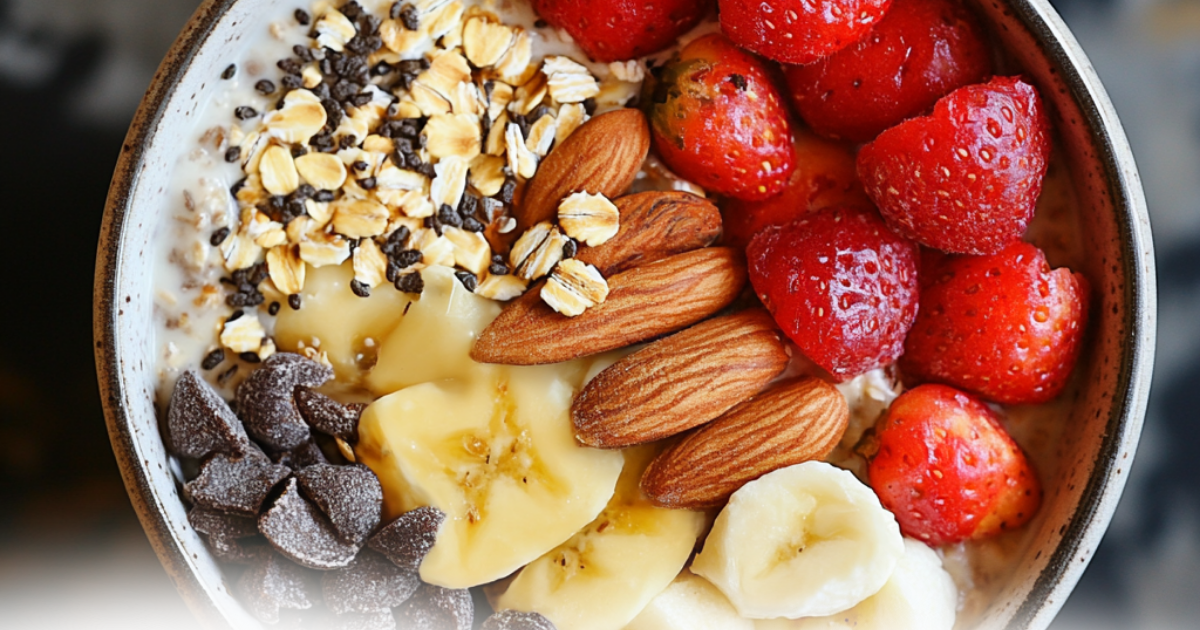When it comes to crafting the perfect bowl of overnight oats, the choice of toppings can make or break your breakfast experience. Among all the possibilities, fruits stand out as the ultimate addition—bursting with natural sweetness, vibrant flavors, and a host of nutritional benefits. But with so many options available, what is the best fruit to put in overnight oats? This article dives deep into the top contenders, exploring their taste, health perks, and how they complement the creamy texture of oats. Let’s start by understanding the basics of overnight oats and why fruits are the real stars of this dish.

Table of contents
Introduction to Overnight Oats
What Are Overnight Oats?
Overnight oats are a no-cook breakfast that’s as easy as it is delicious. All you need to do is soak oats in a liquid—milk, plant-based alternatives, or even yogurt—overnight in the fridge. By morning, the oats are soft, creamy, and ready to eat. This time-saving recipe is perfect for busy mornings, giving you a nutritious meal without the hassle.

Nutritional Benefits of Overnight Oats
Packed with complex carbs, fiber, and plant-based protein, overnight oats are a powerhouse for sustained energy. They’re naturally gluten-free (if you choose certified oats) and can be tailored to suit dietary needs, whether you’re aiming for weight loss, muscle gain, or simply a balanced breakfast.
Why Fruit Is Essential in Overnight Oats
Adding fruit to overnight oats isn’t just about flavor—it’s about balance. Fruits bring a natural sweetness that reduces the need for added sugars, along with fiber, vitamins, and antioxidants. From tangy berries to tropical mangoes, fruits elevate oats from a simple base to a vibrant, nutrient-packed meal. By choosing the right fruits, you can enhance both the taste and health benefits of your breakfast, check out Best Fruit for Overnight Oats.
Key Criteria for Choosing the Best Fruit
Taste Compatibility with Oats
When deciding what is the best fruit to put in overnight oats, taste matters most. The creamy base of overnight oats pairs well with both sweet and tangy fruits. Fruits like bananas and mangoes offer natural sweetness, while berries like blueberries or raspberries add a tart contrast. These flavors complement the mild, nutty taste of oats, making your breakfast a balanced treat.
Nutritional Value and Health Benefits
Fruits aren’t just tasty—they’re also packed with nutrients that boost your health. For example, kiwis are loaded with vitamin C, while bananas provide potassium and prebiotics for gut health. Adding fruits to overnight oats ensures a steady supply of antioxidants, fiber, and essential vitamins. These nutrients support digestion, reduce inflammation, and even improve heart health.

Ease of Preparation and Availability
Let’s not forget convenience! Some fruits, like apples and bananas, are easy to slice and widely available year-round. Berries, whether fresh or frozen, are perfect for quick preparation and long-term storage. Opting for fruits that require minimal effort ensures you can prepare your overnight oats without breaking a sweat—even on hectic mornings.
Top 10 Fruits for Overnight Oats
Bananas: The Prebiotic Powerhouse
Bananas are a staple when answering what is the best fruit to put in overnight oats. They’re sweet, creamy, and easy to mash into oats. High in potassium and prebiotic fiber, bananas aid digestion and keep you full longer. Plus, their natural sugars eliminate the need for added sweeteners.
Berries: Antioxidant Champions
Berries—blueberries, raspberries, and strawberries—are small but mighty. Loaded with antioxidants and fiber, they help fight inflammation and keep your heart healthy. Their tangy flavor adds a zesty kick to overnight oats without overpowering the dish.
Apples: Fiber-Boosting Delight
Chopped or grated, apples are a crunchy addition to oats. They’re rich in pectin, a type of fiber that promotes gut health. Sprinkle some cinnamon over apple-infused oats for a cozy, pie-like flavor.
Mangoes: Tropical Sweetness
For a tropical twist, mangoes are hard to beat. Packed with vitamins A and C, mangoes bring a burst of sweetness that’s perfect for balancing tart toppings like Greek yogurt. Just a few slices can transform your oats into a summer-inspired treat.
Peaches: Juicy and Vitamin-Rich
Peaches bring a delicate, juicy flavor to oats. They’re high in beta carotene and vitamin C, making them great for boosting immunity and promoting healthy skin. Fresh or frozen, peaches are a wonderful addition.
Kiwi: A Vitamin C Treasure
Kiwi is a vibrant option that adds both color and tang to your oats. Its high vitamin C content supports immunity, while its small seeds provide a bit of crunch. Pair kiwi with a drizzle of honey for an irresistible combination.
Plums: Low-Sugar Energy Boosters
Plums are often overlooked, but their low-sugar profile and rich phenolic compounds make them a smart choice. These compounds may even help with fat metabolism, adding a health boost to your morning bowl.
Pears: Long-Lasting Fullness
Pears are perfect for those who need a filling breakfast. High in soluble fiber, they slow digestion and keep you satisfied. A diced pear mixed into oats adds a subtle sweetness and a tender texture.
Grapes: Fat-Converting Goodness
If you’re looking for something different, try grapes. Resveratrol, found in grapes, helps convert white fat into calorie-burning beige fat. While a handful of grapes won’t overpower your oats, they’ll pack a surprising punch of health benefits.
Figs: Fiber and Calcium Duo
Figs are a luxurious addition to oats, offering a unique sweetness and chewy texture. They’re packed with fiber and calcium, making them a great choice for bone health. Fresh or dried, figs add a gourmet flair to your breakfast.
Tips for Mixing and Matching Fruits
Creating Flavorful Combos for Variety
One of the joys of overnight oats is the freedom to get creative with toppings. Pairing fruits can amplify both taste and nutritional value. For instance, combining bananas and blueberries creates a balance of creamy sweetness and tartness. Or, try mango with raspberries for a tropical and tangy twist. Mixing fruits allows you to enjoy the best of both worlds—varied textures and flavors that make each bite exciting.
Seasonal Choices for Freshness
Choosing seasonal fruits ensures maximum freshness and flavor. In the summer, go for juicy peaches and plums. During winter, apples, pears, and citrus fruits shine. Not only do seasonal options taste better, but they also support local farming and often come at a lower cost. For inspiration on seasonal recipes, check out Mango Overnight Oats: Easy and Delicious Breakfast Recipe.
Health Benefits of Fruit-Infused Overnight Oats
Gut Health and Digestion Support
Fruits like bananas, kiwis, and pears are rich in prebiotics and fiber, which promote healthy digestion. Adding these to your overnight oats can keep your gut happy and your mornings energized. By combining oats with fruit, you create a breakfast that supports gut bacteria and smooth digestion.
Boosting Immunity and Reducing Inflammation
Fruits such as berries, mangoes, and oranges are packed with antioxidants and vitamins that strengthen immunity. These nutrients fight inflammation, protect against chronic diseases, and keep you feeling your best. Eating a bowl of fruit-laden overnight oats is like giving your body a daily dose of health insurance.
Common Mistakes to Avoid When Adding Fruits
Overloading on Sugary or Dried Fruits
When thinking about what is the best fruit to put in overnight oats, it’s easy to get carried away. While dried fruits like raisins or sweetened cranberries are convenient, they often pack added sugars. Too much sugar can spike your energy and leave you hungry soon after. Instead, focus on fresh or frozen options like berries or mangoes for natural sweetness and nutrients.
Ignoring Ripeness for Optimal Taste
Using underripe or overripe fruits can throw off the taste and texture of your oats. An unripe banana, for example, might be too firm and lack sweetness, while an overripe one can turn mushy. The key is to choose fruits at their peak ripeness. For apples and pears, look for firm textures, and for tropical fruits like mangoes, ensure they’re slightly soft to the touch.
FAQs: FAQs on What is the Best Fruit to Put in Overnight Oats?
Can I Use Frozen Fruits?
Absolutely! Frozen fruits are a convenient and cost-effective way to add nutrients to your oats. They retain most of their vitamins and minerals and can be added directly to the oats the night before. By morning, they’ll thaw and blend seamlessly into your dish. For a refreshing twist, mix frozen berries or mango chunks into your recipe.
Which Fruits Should Be Avoided?
While almost all fruits work in overnight oats, avoid citrus fruits like oranges or grapefruits. Their high water content can make the oats soggy, and the acidity may overpower other flavors. Instead, opt for fruits that hold their texture, like apples, pears, or bananas. If you’re aiming for variety, remember that what is the best fruit to put in overnight oats depends on personal taste and preparation.
How Long Do Fruits Stay Fresh in Overnight Oats?
Fresh fruits typically stay good in overnight oats for up to two days if stored in the fridge. However, some, like bananas or kiwi, may become mushy if left too long. To maintain freshness, add delicate fruits like berries closer to serving time. For an extended shelf life, consider using firmer fruits like apples or frozen options.
Conclusion: Finding Your Perfect Mix
Experimentation Is Key to Personal Preferences
So, what is the best fruit to put in overnight oats? The answer depends on your taste and nutritional needs. Bananas add creaminess, while berries provide a tangy zest. Tropical fruits like mangoes bring a burst of sunshine, and apples offer a satisfying crunch. By mixing and matching, you can discover endless combinations that keep breakfast exciting.
Highlighting the Top Pick Based on Versatility
Ultimately, berries often take the crown for their versatility, antioxidants, and vibrant flavor. Whether fresh or frozen, they complement oats beautifully. But don’t be afraid to experiment—your perfect mix might just surprise you!

